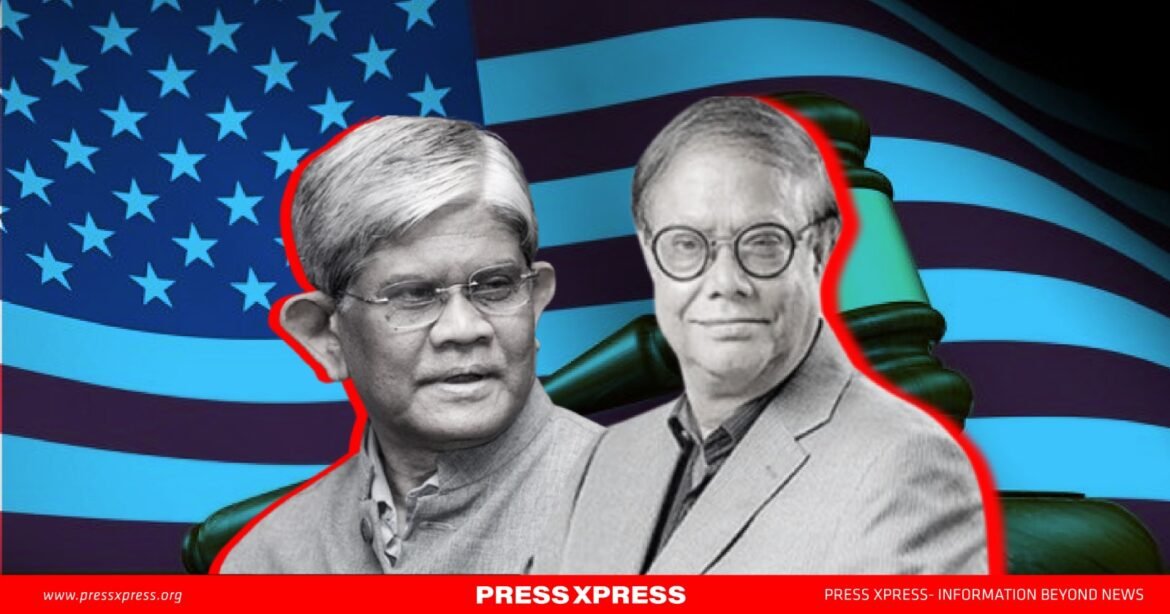A US court issued bench warrants Thursday for the arrest of Bangladesh’s Interim Government’s Finance Adviser, Salehuddin Ahmed, and Central Bank Governor, Ahsan H. Mansur, in a move initiated by a power company seeking to enforce $31.9 million in arbitration awards against Bangladesh.
The Bangladesh government immediately filed an appeal, according to Law360, a New York-based legal news service.
However, Bangladeshi Ambassador to the United States, Mushfiqur Fazal Ansari, in a post on his verified Facebook page on Saturday, October 26 claimed that the warrant has been suspended.
The order, granted by US District Judge Carl J. Nichols, instructs US Marshals to “detain and bring to court” Ahmed and Mansur at the request of Smith Cogeneration (Bangladesh), a power company aiming to secure testimony from the officials as part of its long-standing effort to enforce the arbitration rulings.
Labeling Ahmed and Mansur as “two of the most senior leaders” in Bangladesh’s finance sector, Smith Cogeneration argued that their depositions are critical for resolving the company’s decade-long pursuit of compensation. Bangladesh, however, swiftly contested the jurisdiction of the court, stating in its appeal to the DC Circuit that Judge Nichols lacks the authority to order the arrests.
Bangladesh also argued that the bench warrants are unenforceable, asserting diplomatic immunity for Ahmed and Mansur, both of whom hold high-ranking positions at the International Monetary Fund and the World Bank. “These individuals are immune from criminal and civil process in the United States,” Bangladesh wrote in the appeal.
Smith Cogeneration, in a motion filed Wednesday for contempt sanctions, alleged that Ahmed and Mansur had been ordered to appear for depositions but failed to do so. The company maintained that without a contempt order, Bangladesh would continue to disregard US court authority and ignore deposition notices.
Ahmed and Mansur were in Washington this week for the annual International Monetary Fund and World Bank Group meetings, a visit that Smith Cogeneration claims might be its only chance to secure depositions as it pursues Bangladeshi assets.
The company’s dispute with Bangladesh dates back to 1997 when Smith Cogeneration signed a power purchase agreement for a barge-mounted power plant in northern Bangladesh. The agreement later unraveled when Bangladesh’s government reportedly withheld essential permits, ultimately scrapping the project in 1999 and seizing a $1.5 million performance bond from Smith Cogeneration.
In 2002 and 2003, an International Chamber of Commerce tribunal ruled in favor of Smith Cogeneration, ordering Bangladesh’s Power Development Board to pay $13.5 million, plus additional sums. A DC federal judge confirmed the awards in 2007 and later revised the judgment to include accrued interest, now totaling over $31 million, according to Smith Cogeneration’s counsel.
A Step Towards U.S. De-Recognition of Bangladesh’s Interim Government?
This development surfaces amid a turbulent period for Bangladesh, following Sheikh Hasina’s removal on August 5 through what Dr Yunus claims was a “meticulously designed” protest. Now under an interim administration led by Dr. Mohammad Yunus, the country faces a notable decline in law and order, marked by a rise in radical Islamist groups openly advocating for strict Sharia law. Additionally, skyrocketing commodity prices are fueling growing public discontent.
The former ruling party, Awami League, and several analysts suggest that the United States may have quietly supported the anti-Hasina protests well before Bangladesh’s 12th general elections and during the July-August movement against Sheikh Hasina’s government.
The timing of this U.S. decision coincides with the recent return of Bangladesh’s Army Chief, Gen. Waker-Uz-Zaman, following a 10-day visit to the United States and Canada. During his trip, Gen. Waker met with United Nations Peacekeeping officials and high-ranking U.S. military and civilian authorities, as reported by the Inter-Service Public Relations (ISPR) of Bangladesh Army.
However, the unexpected U.S. stance poses a significant challenge for Dr. Yunus’s interim government, which seeks international support amidst escalating internal uncertainty. Observers question whether this might be an early sign of Washington reconsidering its stance toward Dr. Yunus’s leadership. Could this mark the beginning of a shift in U.S. support for the current administration?


